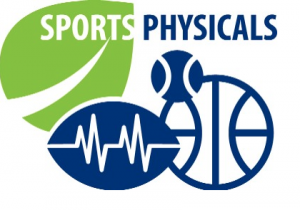 Sports physicals, also known as preparticipation physical examinations (PPE), help determine if your child is healthy enough to participate in a specific sport. There are two main parts to a sports physical—going over medical history and performing a physical exam. We’ll go over these and help you understand the importance.
Sports physicals, also known as preparticipation physical examinations (PPE), help determine if your child is healthy enough to participate in a specific sport. There are two main parts to a sports physical—going over medical history and performing a physical exam. We’ll go over these and help you understand the importance.
Children of all ages will benefit from participating in sports. Children can learn many life skills such as team work, time management, competition, conflict resolution as well help to improve social skills. While the benefits of exercising and participating in sports heavily outweigh the risks, it is very important to have every child undergo a PPE. Sports physicals are required for student-athletes who want to participate in middle school, high school or summer sports/camps. But even if a PPE isn’t required, doctors still highly recommend getting one.
The pre-participation sports physical is a complete physical that pays special attention to the cardiopulmonary and the muscle-skeletal systems. Remember that the main purpose of this exam is to identify children who are at risk for illness, injury, or sudden death during sports activities. If problems are detected during this evaluation, the examining physician may be able to re-direct the young athlete into a more appropriate sport if the condition is not correctable.
What to expect in the sports physical
- Medical History – Sports physicals include a health history questionnaire. Questions involve injury, illness or conditions, such as asthma, and ensure that they are being properly managed. Medical history questions also ask about the following:
-
- Family history of illness
- Diagnosed medical conditions
- History of heart problems
- Medications taken
- Allergies
- History of head injury
- History of fainting
- History of shortness of breath
- Previous hospitalizations or surgeries
- Immunizations
- For female athletes the physical inquires about menstrual cycle irregularities
2. Physical Exam – This test looks for anything unusual.
-
- Checking the heart, abdomen, lungs, ears, throat, and nose
- Taking a blood pressure and pulse
- Asking about alcohol, drug, and dietary supplements use
- Record your height and weight
- Test your vision
- Evaluate your posture, joints, strength, and flexibility
What happens if the doctor finds a problem?
The sports physical helps your Coastal Urgent Care doctor to identify any conditions or problems that might keep the athlete out of the game or affect performance. If a problem is discovered, the doctor and athlete often can work together to develop a plan to get the athlete ready for action.
If the doctor finds a problem, he or she might recommend certain tests and a follow-up exam. In many cases, the doctor can suggest treatment or a plan to rehabilitate an existing injury to get the athlete ready when the sport season begins. The doctor conducting the exam also works with parents and coaches to assist an athlete with a medical condition to compete safely.
If there are no abnormal findings during the exam, the athlete will be cleared to participate in his or her sport. It is important, however, that the athlete report any changes in his or her physical condition, because early diagnosis and treatment can help get the athlete back on track and back in the game.
If you need to schedule a sports physical for your child contact your local Coastal Urgent Care today!
